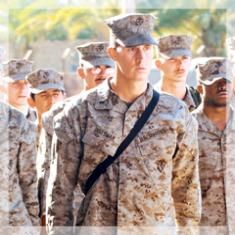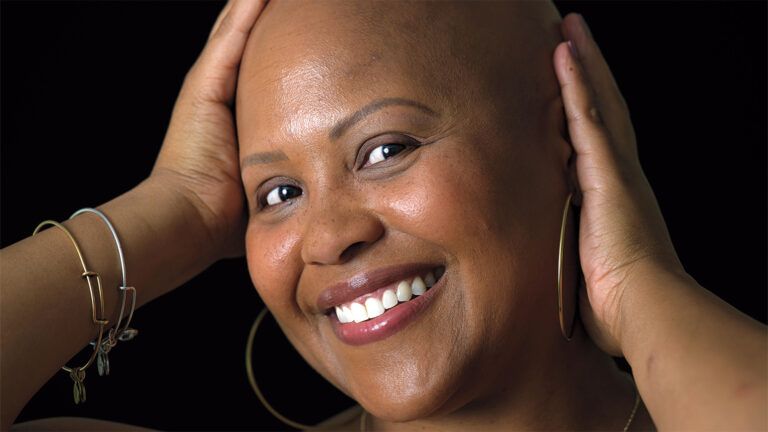I burrowed deeper into my sleeping bag. The concrete floor in the quarters I shared with three other Marine platoon commanders felt harder than usual.
The others had likely been up for hours, anxious to patrol the streets of Ramadi, Iraq, with their men. But I’d lain here until the last minute. I wished I’d never have to get out of bed.
This room was the one place where I didn’t have to face my men. Where I didn’t have to make decisions that could cost them their lives.
Again I relived the events of that day just over two weeks ago. That image of Lance Corporal Bolding on the ground, his legs blown from his body, played back.
A lieutenant nicknamed Ox blocks the way 10 feet from the scene. “You don’t want to see this,” he says, the words echoing in my mind. “You want to be able to lead your men with a clear head.” He’d meant well, but now it seemed like so much bravado. As if by looking away I could stop the pain.
Nothing was going to bring Bolding back. If only I could reverse my order for that day. That was the only way he’d still be alive.
Once, I’d found comfort in my faith. My men and I had prayed that morning, recited the 23rd Psalm, like we did each day.
I’d started the prayer as a pre-battle ritual three months before, when we’d first come to Iraq, hoping it would bring us together. We gathered in a hangar each morning, the men forming a semicircle, heads bowed. But God was AWOL when I needed him most.
Bolding had been our platoon mascot, the one we rallied behind. He had a smile so electric it could have powered a small town. His enthusiasm was a force to be reckoned with. He had seemed unstoppable, indestructible.
How could my men—how could I—go on without him? I worried about them. We were such an odd collection of guys.
I thought about Private First Class Gabriel Henderson, a 19-year-old who looked 15, skinny, usually wearing a goofy grin and streaks of dirt on his face. How had he ever become a Marine? Then again, the same could be asked of me.
As a junior at Princeton I’d gone to Officer Candidate School just to burnish my résumé, never dreaming I’d actually see combat.
But senior year, corporate job offers had seemed trivial next to the opportunity to make a real difference in the world. I wanted to feel responsible for something that mattered.
I remembered a sergeant screaming in my face, “Candidate, the currency we trade in is human lives. Do you think you can handle that responsibility?” I had thought I could. Now, too late, I knew otherwise.
I had failed my men. I was to blame for Bolding’s death. Over and over I reviewed my decisions that day. What could I have done differently?
We’d been ordered to guard a school while Ox inspected repairs inside. I had resisted the assignment. Outside the school, fronted by a canyon of housing complexes, I knew we’d be sitting ducks. But I’d been overruled.
I nervously paced the length of our five Humvees parked along a small street outside the school. My men knelt next to the vehicles, eyes trained on the apartment buildings opposite for any movement.
After what seemed like an eternity Ox emerged from the school, a crowd of 20 children trailing behind. Henderson and other Marines handed out soccer balls and other gifts we’d brought.
I gave the order to mount up and waited by my door. Behind me, next to our third vehicle, clamoring for more gifts, the kids stood in a knot. I smiled and felt myself relax. It was nice to be appreciated.
Boom! A rocket-propelled grenade streaked by a few feet over the top of my door. Then another explosion. The children disintegrated into flames and smoke. I heard Marines screaming for our two medics: “Doc up! Doc up!”
I jumped to the ground. Dead and wounded children lay on the sidewalk, blood everywhere. Marines ran helter-skelter, collecting the wounded, applying first aid where they could. The medics worked frantically.
One of my squad leaders, Corporal Chris Bowen, ran up to me. Should we stay or go? I knew there’d be another attack. But I disregarded the danger. We were Marines, and wounded children needed us.
“We’ve got to form a perimeter around these kids until an Iraqi medical team can get here,” I yelled over the melee.
Bowen nodded. “Yes, sir. We’ll make it happen.”
I remembered being amazed at how fluidly my men moved into position, like a championship football team running a two-minute offense. I walked around the perimeter on the eastern side of the school, my heart pounding. A call came in: Help on the way. Not much longer.
To the north, I heard a boom. Then another. The horrifying cries of “Doc up!” on my radio. I ran toward the explosions. My radio crackled again, the words stabbing me: “Bolding’s been hit, sir. His legs, they’re gone, sir. They’re gone, sir.”
I recalled returning to base, telling my men that Bolding wouldn’t want us to lose sight of our mission, seeing Henderson nodding, his face streaked with tears. I remembered my words catching in my throat, turning, walking to the bathroom and sinking to the floor.
But my mind had never left the scene at the school. Why hadn’t I ordered Ox to leave the school sooner? Maybe I should have put the safety of my men over the children? It had seemed like the right decision to stay. Now two weeks later I second-guessed everything.
If I didn’t get up soon someone would come looking for me. I forced myself out of my sleeping bag. I felt exhausted. Mentally. Physically. Spiritually. I was hungry, but didn’t feel like eating. Didn’t feel like doing anything.
After Bolding’s death, I’d stopped participating in the daily prayer. What was the point?
Slowly, I put on my fatigues, then my boots, Kevlar vest and helmet. My M-16 felt almost too heavy to lift. My men were waiting for me inside the hangar where we began our missions. I gave the order to head out, but avoided eye contact.
Our mission was to make our way on foot to a building we had secured to keep watch over one of the city’s main thoroughfares. On a good day it took about a half hour. When we encountered militants, which was often, it could take much longer.
I shuffled along toward the rear. It was early, but already it was sweltering, making even this short journey grueling. I wanted only to be back in my room. Please, don’t let anything happen today.
Yet again, I thought of Bolding. How nothing fazed him. How he never let anyone get down. If anyone could’ve helped my men through their loss, it was Bolding. It seemed so unfair. Why couldn’t it have been me in the line of fire?
My men moved methodically through the streets of Ramadi, alternating between advancing and covering other members. There was a rhythm to their work, every soldier backed by another.
I noticed Bowen walking among the men, talking to them, patting Henderson on the shoulder, teaching as always.
I watched two lance corporals getting in each other’s business, trading insults, tension rising. Then one reached over and squeezed the other’s arm and offered him his last stick of gum, both of them laughing.
A private, the shortest man in the platoon, volunteered to carry the machine gun, adding 20 pounds to his already heavy load. We reached the lookout building without incident.
I found a spot where I thought no one would notice me and sat on the floor. The men took turns watching the streets below, weapons ready. The rest began building sandbag bunkers at the building’s entrances. Everyone was busy doing a job. Everybody but me.
I spent the afternoon watching my men go about their work. For the first time in two weeks I found myself thinking about something other than Bolding’s death. Once, my men looked to me for leadership. Now, I looked to them.
That evening, back at base, I was standing alone when Henderson came up to me. “Sir, you know none of the platoon blames you for what happened to Bolding. It’s okay, sir.”
I stared at the skinny private, not knowing what to say. “Bolding’s in heaven,” he continued. “I know he’s smiling down at us right now, just like he always smiled at us when he was here. He’s okay, sir. Don’t worry, sir.”
I had to turn away to keep from crying. I’d never forget Bolding, but for the first time since his death, God felt present again. I could see him at work healing and comforting my men, restoring our souls, sending Henderson to reach out to me. We were a platoon, in good times and bad. Nothing could take that away.
Tomorrow, when the men gathered to say the 23rd Psalm together, I’d be there with them.
Read more about Guideposts’ Military Outreach Program, providing comfort and resources for military families.






